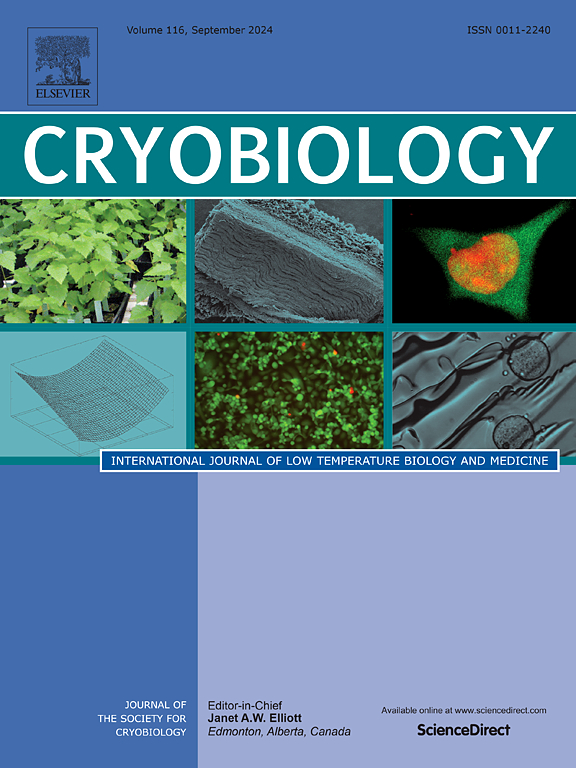原花青素B2通过抑制氧化应激和细胞凋亡减轻小鼠睾丸冷冻后组织损伤。
IF 2.1
3区 生物学
Q2 BIOLOGY
引用次数: 0
摘要
对于无法获得精子的不孕症患者或需要放疗的青春期前男孩,睾丸组织冷冻可用于后期移植,是一种保留男性生育能力的潜在有效方法。冷冻过程中引起的氧化应激是造成组织损伤的重要原因。原花青素B2 (Procyanidin B2, PCB2)是一种广泛存在于植物中的多酚类天然化合物,具有抗炎、抗癌和神经保护作用,其抗氧化能力尤其值得关注。研究表明,多氯联苯对生殖系统有保护作用。然而,其在减轻睾丸组织低温损伤中的具体作用及其机制尚不清楚。本研究探讨在玻璃化的小鼠睾丸组织冷冻保护液中加入PCB2是否能减轻睾丸组织的冷冻损伤,并探讨其可能的机制。我们的研究结果表明,冷冻小鼠睾丸组织呈现细胞活力下降和诱导氧化应激。相反,PCB2有效地减轻了这些不利影响。此外,PCB2改善了冷冻引起的小管结构紊乱,增加了支持细胞连接功能相关蛋白的表达。进一步实验表明,PCB2激活核呼吸因子2 (Nrf2)/血红素加氧酶1 (HO-1)抗氧化信号通路,提高下游抗氧化酶活性,改善线粒体动力学稳态。此外,PCB2可以改善细胞凋亡,同时增加参与睾酮合成的关键酶的表达水平。综上所述,这些结果表明PCB2通过抑制氧化应激和细胞凋亡来减轻小鼠睾丸组织在冷冻过程中的损伤。本文章由计算机程序翻译,如有差异,请以英文原文为准。
Procyanidin B2 alleviates damage to mouse testicular tissue after freezing by inhibiting oxidative stress and apoptosis
For infertile patients who are unable to obtain sperm or prepubertal boys who require radiotherapy, testicular tissue freezing can be used for later transplantation and is a potentially effective method of preserving male fertility. Oxidative stress caused by the freezing process is an important cause of tissue damage. Procyanidin B2 (PCB2) is a polyphenolic natural compound widely distributed in plants that is known for its anti-inflammatory, anticancer, and neuroprotective properties, and its antioxidant capabilities are particularly noteworthy. Research has indicated that PCB2 exerts a protective effect on the reproductive system. However, its specific role in mitigating testicular tissue cryoinjury and the underlying mechanisms remain unclear. This study investigated whether adding PCB2 to a cryoprotective solution of mouse testicular tissue can alleviate the cryoinjury of testicular tissue and its possible mechanism. Our findings revealed that frozen mouse testicular tissue presented decreased cell viability and induced oxidative stress. Conversely, PCB2 effectively mitigated these adverse effects. In addition, PCB2 improved the tubular structural disorganization caused by freezing and increased the expression of proteins related to the junction function of Sertoli cells. Further experiments indicated that PCB2 activated the nuclear respiratory factor 2 (Nrf2)/heme oxygenase 1 (HO-1) antioxidant signaling pathway, increased the activity of downstream antioxidant enzymes, and improved mitochondrial kinetic homeostasis. Additionally, PCB2 ameliorated apoptosis while increasing the expression levels of key enzymes involved in testosterone synthesis. In summary, these results suggest that PCB2 attenuates damage to mouse testicular tissue during freezing by inhibiting oxidative stress and apoptosis.
求助全文
通过发布文献求助,成功后即可免费获取论文全文。
去求助
来源期刊

Cryobiology
生物-生理学
CiteScore
5.40
自引率
7.40%
发文量
71
审稿时长
56 days
期刊介绍:
Cryobiology: International Journal of Low Temperature Biology and Medicine publishes research articles on all aspects of low temperature biology and medicine.
Research Areas include:
• Cryoprotective additives and their pharmacological actions
• Cryosurgery
• Freeze-drying
• Freezing
• Frost hardiness in plants
• Hibernation
• Hypothermia
• Medical applications of reduced temperature
• Perfusion of organs
• All pertinent methodologies
Cryobiology is the official journal of the Society for Cryobiology.
 求助内容:
求助内容: 应助结果提醒方式:
应助结果提醒方式:


